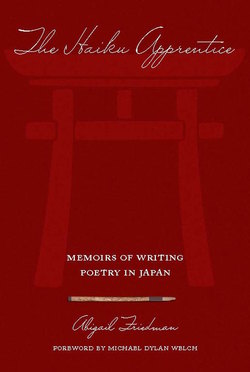Читать книгу The Haiku Apprentice - Abigail Friedman - Страница 7
На сайте Литреса книга снята с продажи.
NOTES ON THE TEXT
ОглавлениеThe events and people I describe in this memoir are real. The events took place over a two-year period in Japan. For the sake of the flow of the narrative, I have condensed the events and conversations into a one-year time frame. On matters of foreign policy, the opinions and views I express in this book are my own and do not necessarily represent the official views of the Department of State or the U.S. Government.
A word on Japanese pronunciation: Japanese vowels are pronounced as in Spanish: a, i, u, e, o. In haiku, the beat of each word is important to counting syllables. Spoken Japanese sounds very regular because each syllable is one beat. Some vowel sounds are lengthened and held for two beats; this is indicated by a macron over the vowel, as in ō. Where the Japanese reading would consist of two o’s, this also is indicated by a macron. A regular o counts as one syllable, while ō counts as two. One other point to note about counting syllables in Japanese is that the letter n, when it comes at the end of a word or at the close of a syllable, is a single syllable in itself. So the word mon, or “gate,” is actually two syllables: mo-n.
In rendering Japanese names into roman script, I have followed Japanese custom of giving the family name first.
All the translations of haiku are mine, unless otherwise stated.
